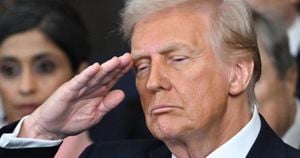The aftermath of the 2025 German Federal Election has triggered significant reactions among political leaders and the parties involved. Announcements of resignations, reflections on electoral strategies, and concerns about rising political extremism are reshaping the political discourse across Germany.
FDP leader Christian Lindner announced his retirement from active politics following the party's poor performance at the polls, where the Free Democrats (FDP) suffered substantial losses, failing to cross the five-percent threshold needed to secure seats in the Bundestag. Lindner expressed, "The Bundestagswahl brought defeat for the FDP but hopefully marks a new beginning for Germany. That’s what I fought for," as he reflected on his 25-year political career, which he now concluded with gratitude for the experiences gained.
The SPD, Germany’s traditional center-left party, also faced severe outcomes, with early projections indicating it had lost about ten percent of its votes compared to the last election. Chancellor Olaf Scholz acknowledged the party's setback, stating, "This is also an electoral defeat," and hinted at potential leadership changes. Notably, Anke Rehlinger, the Minister-President of Saarland, confirmed she was not positioned to lead the SPD at this time. "It’s currently not my option to become party chair after such a dreadful result," Rehlinger stated, emphasizing the need for stability within the government.
Specific leadership roles within the SPD are under scrutiny, with co-party leader Lars Klingbeil poised to potentially take over as chair of the parliamentary fraction, indicating the party’s need for renewed leadership. Klingbeil remarked on the necessity of rebuilding trust and strength within the party branches to navigate upcoming challenges.
Meanwhile, reactions from outside Germany also spotlighted the impact of the election results. Former US President Donald Trump expressed his satisfaction with the outcomes, stating on Truth Social, "It looks like the conservative party in Germany has won the much-anticipated election," aligning the German results with sentiments observed during the recent US elections. He attributed the shifts to public dissatisfaction with current political norms, especially concerning energy and immigration policies.
The severe results of the election have led to apprehensions, especially concerning the right-leaning party, AfD, which more than doubled its votes since the last federal election. Josef Schuster, president of the Central Council of Jews, expressed alarm over this outcome, stating, "It must concern us all, as one-fifth of German voters have cast their ballots for at least partly right-extremist party. We face serious challenges going forward toward political stability. This is particularly alarming considering the current tumultuous external conditions."
Political analysts predict the formation of yet another Grand Coalition, likely between the CDU and SPD, which signals Germany’s continuing retreat from more radical governing coalitions. Since independent parties like the FDP have been effectively sidelined, the larger parties may attempt to align moderate views to stabilize governance. This could mean enhanced focus on public concerns as coalition talks progress.
Statements made by various political figures also reflected on the general public sentiment burgeoning from these electoral results. Yasmin Fahimi, President of the German Trade Union Confederation, noted, "Almost 20 percent for the AfD is 20 percent too much and is no clear sign for the economic impulses we need right now," showcasing growing unease over the rise of far-right narratives. This sentiment indicates broader concerns amid economic uncertainties propagated by political volatility.
Looking to the future, FDP members like Marie-Agnes Strack-Zimmermann pledge to uphold the party’s foundational values amid reconstruction efforts. "I stand fully behind the FDP and will take on responsibility wherever necessary and desired," she stated, highlighting the party's commitment to rallying its members during challenging times.
The political arena post-election is filled with uncertainty and potential. With the rising number of parties gaining traction and altering the traditional seating arrangement of the Bundestag, the need for strategies to reintegrate lost voter segments becomes apparent. Political leaders across the spectrum are signaling readiness to deliberate, indicating this may be the turning point for not only the SPD and FDP but the entire German political scene.
The horizon appears complex as Germany adjusts to its electoral outcome, with leaders focusing on how to best represent and stabilize public sentiment. The narrative of rising extremism and its ensuing debates underpin the challenges facing immediate legislative agendas. This election could mark the beginning of adjustments within Germany's political fabric, illustrating the shifting tides in public opinion amid broader global conversations.
With the election results taking center stage, all parties involved will have to recalibrate their approaches and messaging. The next steps for these political entities could determine their trajectories and public reception as they work to navigate the tumultuous waters of governance and public expectations. The coming months are likely to be pivotal for Germany as they work toward rebuilding trust and operational capacity following the election fallout.



